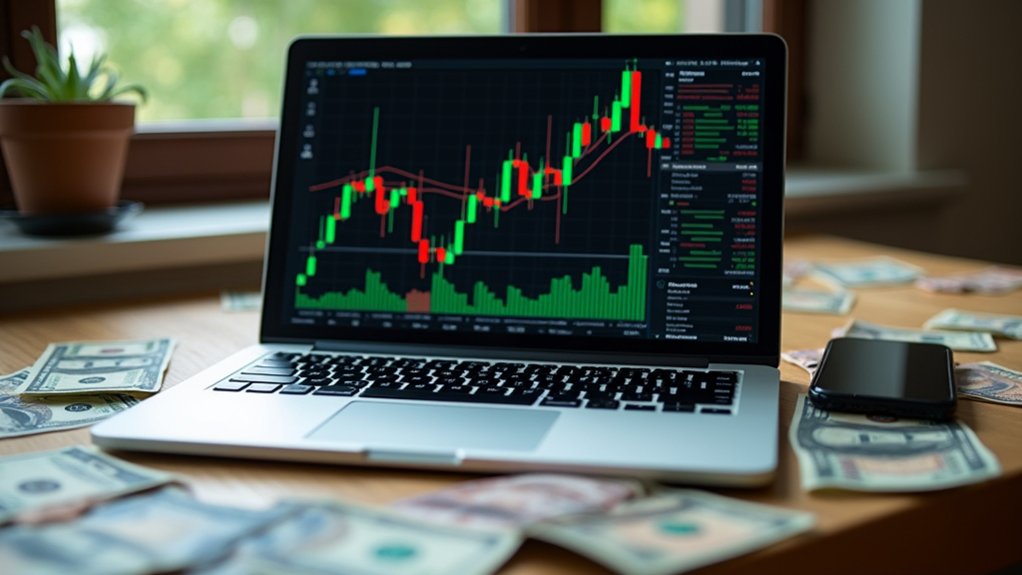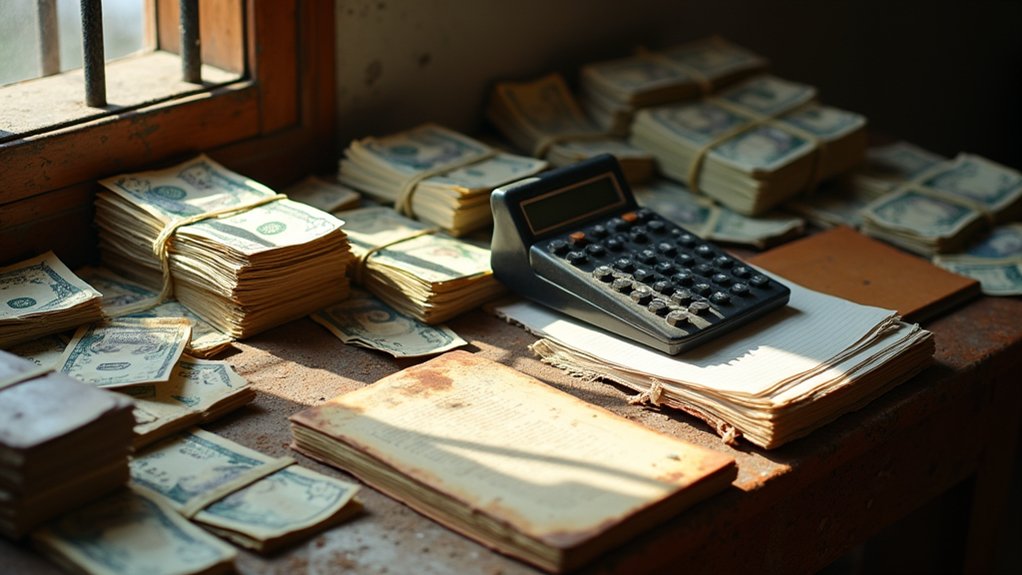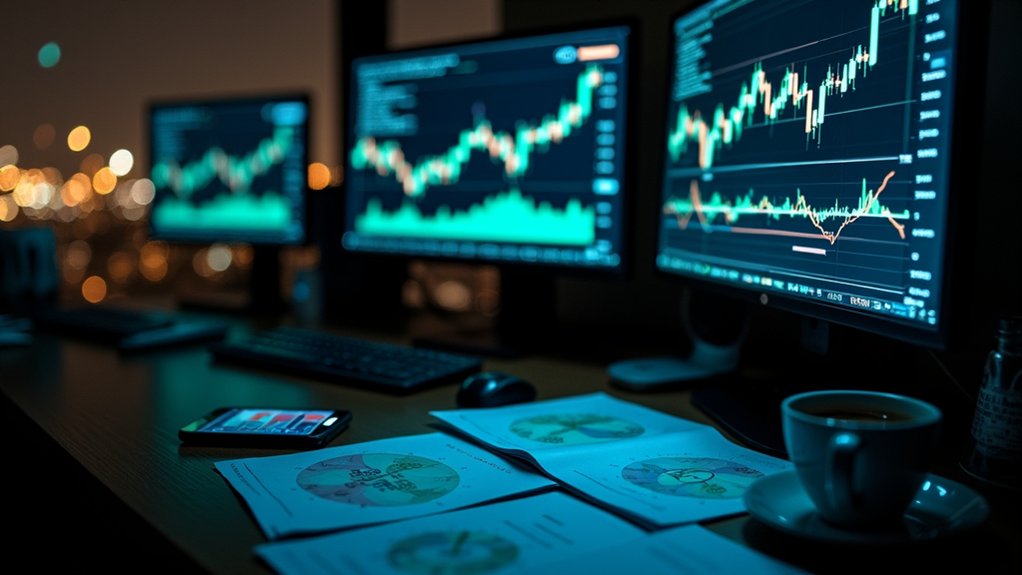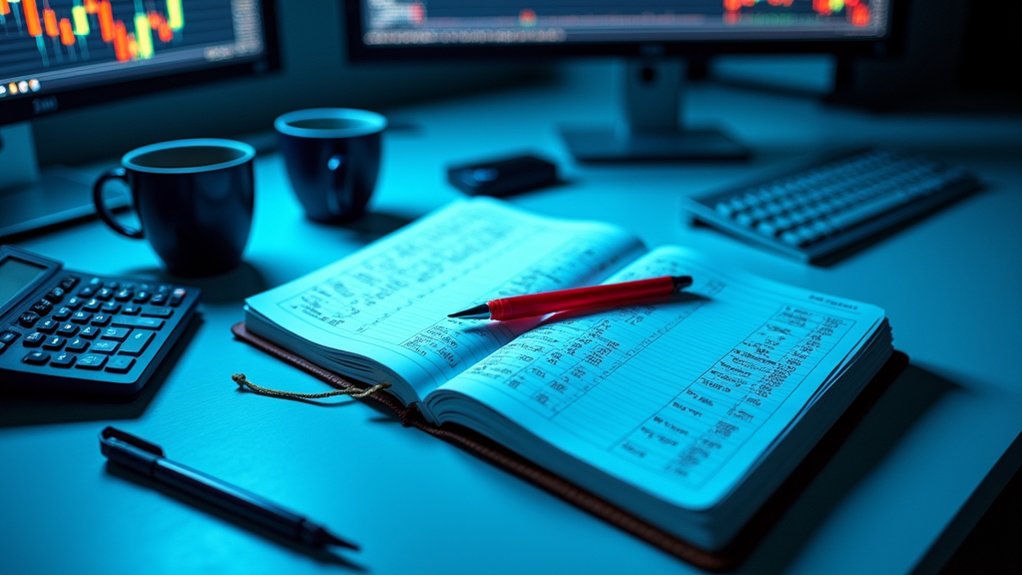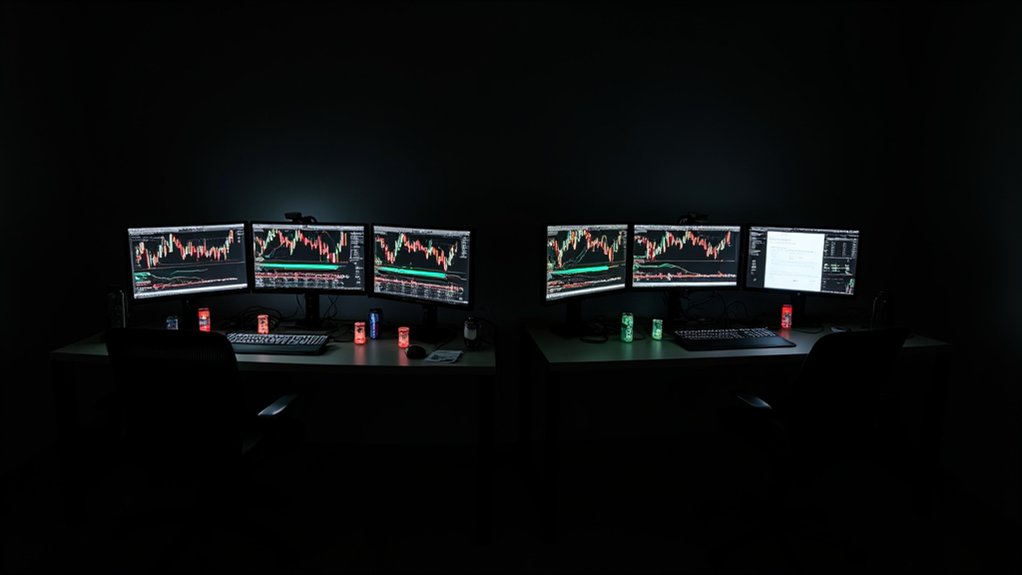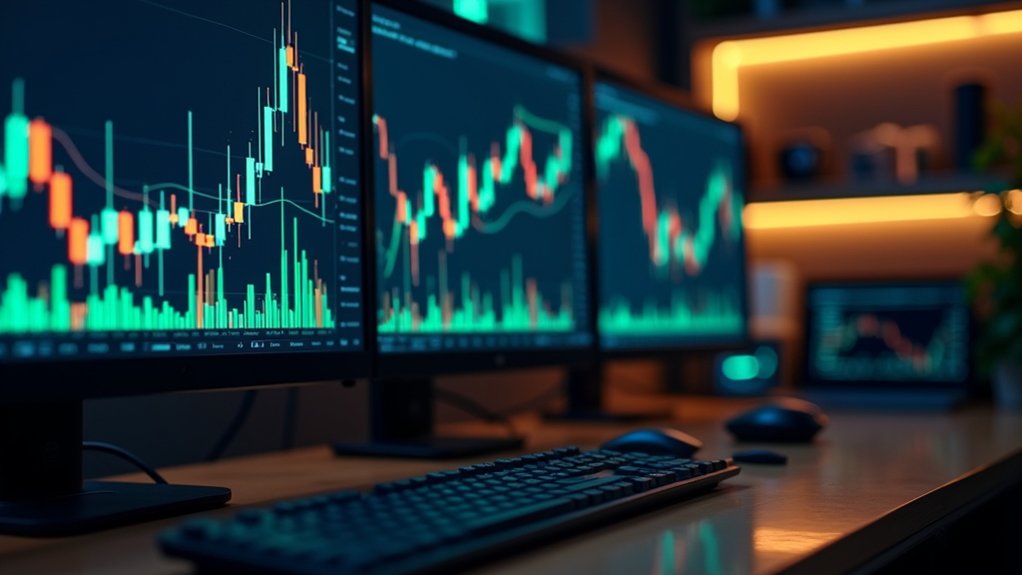Forex trading is legal in the Democratic Republic of the Congo if traders use authorized channels, but there's no dedicated retail regulator watching out for individual traders—just the Central Bank of Congo enforcing currency controls and a 0.2% government fee on every foreign exchange operation. The country runs on dollars despite the Congolese franc being official currency, only 26% of people have bank accounts, and Telegram scammers flood the zone with “guaranteed profit” schemes while legitimate international brokers like Fusion Markets and Hantec quietly accept Congolese clients. The mechanics, the money rules, and the minefield deserve a closer look.
Quick Facts That Matter
- Forex trading is legal via authorized channels, but 89–91% deposit dollarization and 0.2% FX fees significantly increase trading costs.
- Only 26% hold bank accounts; limited infrastructure forces reliance on cash, international brokers, and mobile money for market access.
- Repatriation mandates, $10,000 reporting thresholds, and forced franc conversions for taxes create compliance burdens and reduce net profitability.
- Optimal trading window is 13:00–17:00 local time during London–New York overlap, offering liquidity exceeding 70 pips versus 30-pip single-session ranges.
- Telegram scams promising guaranteed profits and fake brokers impersonating legitimate firms exploit low financial literacy; over 40,000 platforms are non-recommended globally.
Overview: Forex Trading in Democratic Republic of the Congo

In the heart of Central Africa, retail forex trading exists in the Democratic Republic of the Congo—but it's complicated.
The Central Bank of Congo runs a managed floating system. The Congolese franc moves with supply and demand, mostly. When things get wild, the BCC steps in.
There's an interbank market—75% of all forex volume—but that's for the big players. Minimum USD 10,000 transactions.
Regular folks? They're navigating a different landscape entirely. Around 230 authorized exchange bureaux operate across the country, concentrated in Kinshasa, Lubumbashi, and Goma, each requiring minimum capital USD 50,000.
Brokers like Fusion Markets and Hantec operate here. Most platforms require JavaScript enabled to access their web-based trading interfaces and data visualization tools. Understanding the regulations and platforms available is essential for anyone entering this market.
The regulatory framework exists under Organic Law No. 18/027.
Foreign exchange reserves hit USD 7.66 billion in July 2025.
Is Forex Trading Legal in Democratic Republic of the Congo?
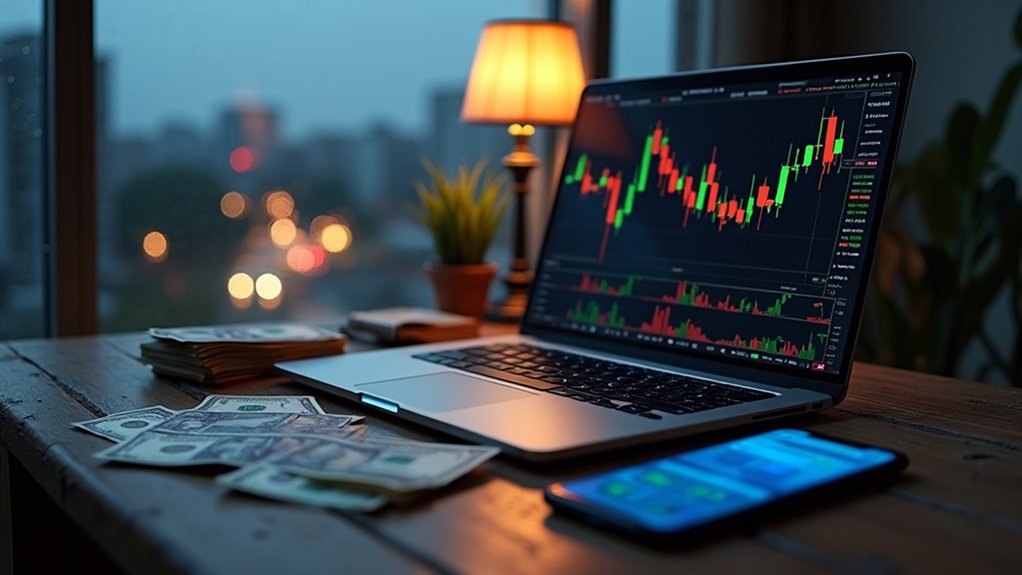
Retail traders wondering if they'll land in jail for opening a forex account can breathe easier. Forex trading is legal in the Democratic Republic of the Congo. No dedicated regulator watches over retail trading specifically, but the Central Bank of Congo handles foreign exchange matters under Organic Law No. 18/027. International brokers accept Congolese clients without issue.
The catch? All forex transactions must go through authorized channels—licensed exchange bureaus and dealers. Trading outside those? Illegal. The Central Bank doesn't mess around with enforcement, especially in border regions where currency controls get serious attention. Understanding the broader regulatory standards that govern forex operations helps traders ensure their activities remain within legal boundaries.
Who Regulates Forex Trading in Democratic Republic of the Congo?
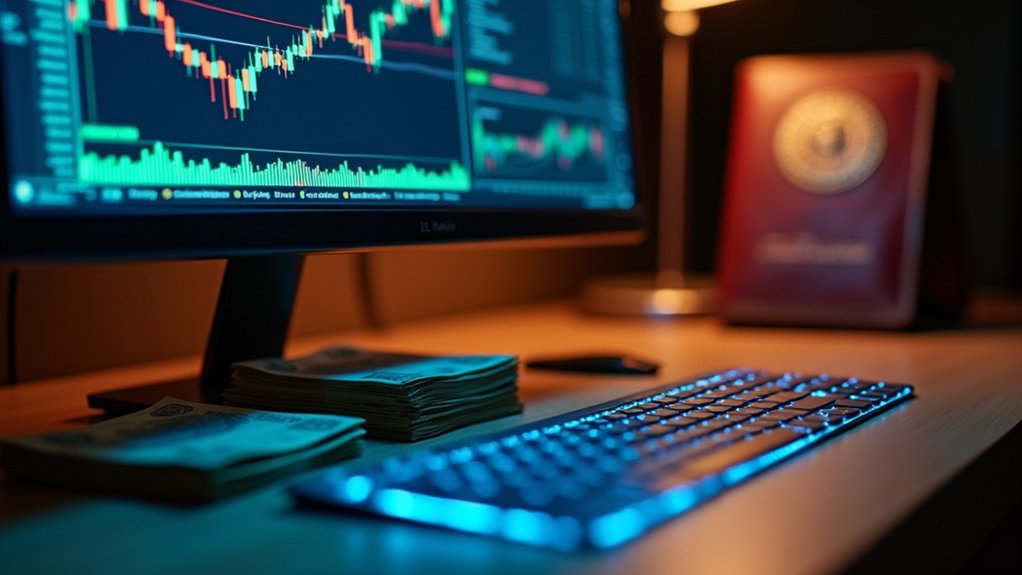
The Central Bank of the Congo (BCC) runs the show when it comes to forex regulation in the Democratic Republic of the Congo. They oversee all foreign exchange activities, working alongside the General Director of Monies and Credit (DGMC).
The whole setup operates under the Congolese Exchange Regulation Act, which sets the ground rules for currency transactions. Commercial banks handle the validation of forex declarations.
The BCC declared the Congolese franc as the primary currency back in 2014, though dollars, euros, and other foreign currencies still circulate freely. It's a relatively liberal system, all things considered. Similar to how Egypt's FRA oversees forex trading activities within their financial markets, the DRC maintains regulatory oversight through its central banking system. The Department of Revenue and Customs under the Ministry of Finance handles tax matters related to forex trading income.
How Forex Trading Works in Democratic Republic of the Congo
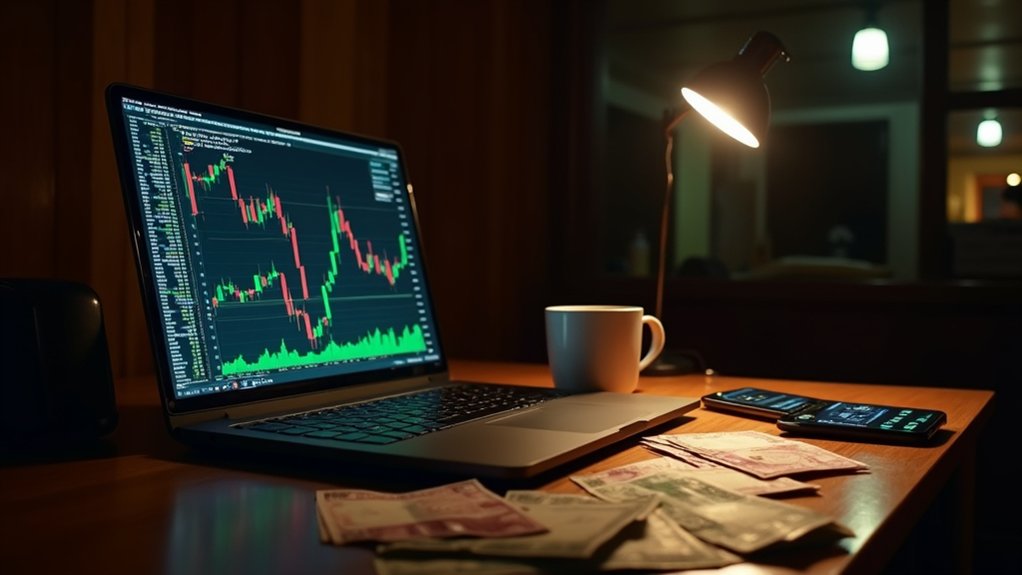
Understanding the regulatory framework is one thing—watching how forex actually moves through the DRC's financial system is another beast entirely.
The Congolese franc floats. Sort of. The Central Bank of Congo publishes daily rates, but dollars and euros dominate actual transactions. Most forex flows through commercial banks operating under tight BCC supervision. Interbank trades start at USD 10,000 minimum. Everything gets reported within 24 hours. Cash rules here—the informal sector handles what official channels can't or won't touch. Transaction costs? High. Efficiency? Limited. The system works, barely, propped up by commodity prices and external economic winds. Central banks typically use intervention mechanisms to stabilize their currencies, though the BCC's capacity for such operations remains constrained by limited foreign reserves.
The dollarization runs deep—foreign currency deposits account for roughly 89-91% of total deposits, severely constraining the central bank's monetary control. This heavy reliance on dollars reflects decades of currency instability and explains why most serious commercial transactions bypass the franc entirely.
Best Time to Trade from Democratic Republic of the Congo
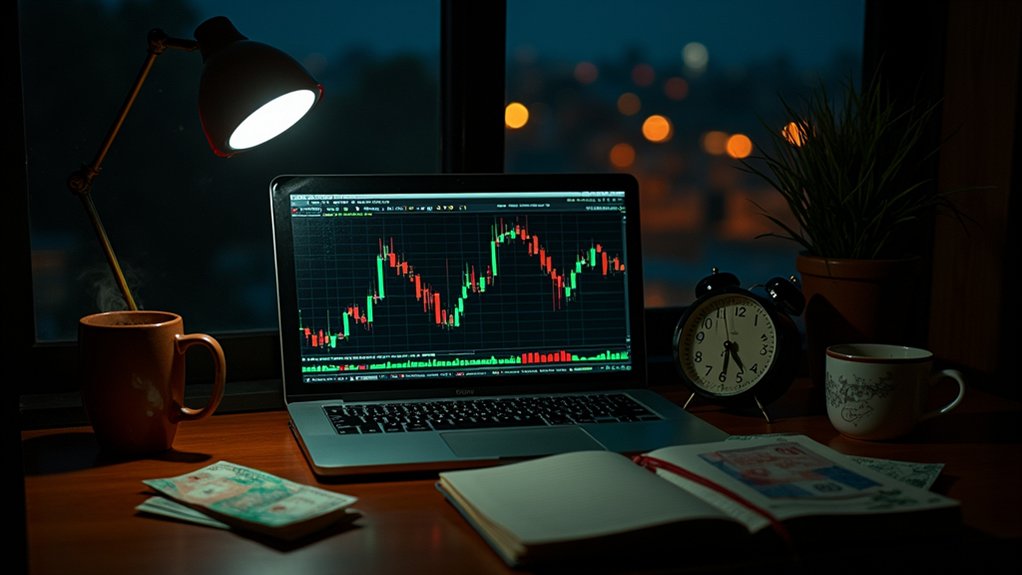
Timing the forex market from Kinshasa means steering through a curious accident of geography—DRC sits at UTC+1, perfectly positioned to catch both European mornings and American afternoons without losing sleep.
London opens at 09:00 local time. New York fires up at 14:00. The sweet spot? 13:00-17:00, when both markets overlap and liquidity peaks. EUR/USD, GBP/USD, and the usual suspects stay active round-the-clock weekdays.
Catch the London-New York overlap between 13:00-17:00 Kinshasa time—that's when liquidity explodes and the majors truly move.
Tokyo-London overlap delivers a secondary window around 08:00-09:00. Those grinding midnight-to-dawn hours? Wider spreads, thinner volume. Single-market sessions typically show narrow ranges averaging 30 pips, while dual-session periods can see movements exceeding 70 pips. Different currency pairs show distinct activity patterns depending on their home markets—GBP pairs peak during London hours while USD pairs surge when New York joins.
Daylight saving time abroad shifts everything twice yearly—verify session times or risk trading ghosts. The forex market operates 24/5 from Sunday 24:00 to Friday 24:00 GMT+2, giving Congolese traders nearly uninterrupted access throughout the business week.
Payments, Deposits and Withdrawals in Democratic Republic of the Congo
Nailing market hours means nothing if a trader can't actually move money in and out of a brokerage account.
Here's the reality: only 26% of Congolese hold bank accounts. Traditional wire transfers demand mountains of documentation and days of processing time. Mobile money offers hope—22% use digital payments monthly—but forex brokers don't always play nice with local mobile wallets. International options like Xoom, WorldRemit, and BOSS Revolution exist, though fees pile up fast. Credit cards start at 4.99 via some services.
The infrastructure gap remains brutally real, leaving many traders scrambling for workarounds. Neighboring South Sudan faces similar challenges with payment infrastructure, where traders must also navigate limited banking access and explore alternative deposit methods to participate in forex markets.
Taxes, Reporting and Money Rules in Democratic Republic of the Congo
Beyond the challenge of simply moving money, the Democratic Republic of Congo wraps forex trading in a thick layer of currency controls that most traders never see coming.
The government mandates a 0.2% fee on every foreign exchange operation. Period. Cross-border transfers above $10,000 trigger mandatory bank reporting to the Central Bank.
Export proceeds must return home within 90 days, or fines arrive.
Mining companies face a 60% repatriation requirement on foreign earnings.
And here's the kicker: all tax payments must be in Congolese francs, forcing constant conversions that eat into profits nobody planned for.
These restrictions function as capital controls that limit how freely traders can move funds in and out of the country.
Forex Trading Scams and Risks in Democratic Republic of the Congo
Scammers love desperation, and the Democratic Republic of Congo offers plenty of it.
Where vulnerability meets predatory schemes, scammers thrive—and Congo's economic hardships create the perfect hunting ground for fraud.
Telegram channels flood in with “guaranteed profits” and zero-risk promises. Fake brokers impersonate legitimate firms through emails, texts, and social media. The IMF's name gets thrown around in scam letters like confetti. Over 40,000 platforms sit on non-recommended lists globally.
Red flags? Missing regulatory oversight, affiliate recruitment schemes, aggressive pressure tactics.
Reality check: legitimate brokers display transparent fees, real regulatory credentials, and investor protections. Nobody guarantees forex profits. Anyone claiming otherwise wants money, not trading partners.
Quick Q and A
Can I Trade Forex Profitably With Less Than $100 in Democratic Republic of the Congo?
Yes, traders in the Democratic Republic of the Congo can open forex accounts with under $100 through brokers like Fusion Markets offering low minimums. However, profitability depends on strategy, risk management, leverage usage, and market knowledge rather than initial capital size.
Which Currency Pairs Are Most Popular Among Congolese Retail Forex Traders?
Specific data on Congolese retail trader preferences is unavailable. However, traders in the Democratic Republic of the Congo likely focus on USD pairs, particularly EUR/USD and GBP/USD, due to global popularity and the Congolese Franc's dollar peg.
Do Mobile Network Issues in DRC Affect My Forex Trades and Positions?
Yes, mobile network disruptions in the DRC can severely impact forex trades. Poor connectivity may cause delayed order execution, slippage, missed stop-losses, or inability to close positions during critical market movements, potentially resulting in significant unexpected losses.
Can I Use Vodacom M-Pesa or Airtel Money for Forex Broker Deposits?
DRC's strict foreign exchange regulations and national currency requirements create significant barriers for using Vodacom M-Pesa or Airtel Money for forex deposits. Most international brokers don't accept these mobile money platforms due to regulatory compliance and cross-border transaction limitations.
What Happens to My Trades During Frequent Power Outages in DRC?
Open trades continue running on broker servers during power outages. Traders lose screen access and cannot manage positions until power returns. Stop-loss orders remain active, but inability to monitor markets during DRC's frequent blackouts increases risk exposure markedly.
The Bottom Line
Forex trading in the DRC isn't impossible—just complicated. Legal grey zones. Sketchy regulation. Payment headaches. Internet that cuts out mid-trade. Currency swings that'd make anyone nervous. Yet traders keep showing up, drawn by promises of profits in a country where traditional opportunities feel limited. The infrastructure's shaky, the risks are real, and nobody's holding anyone's hand. That's the actual story. Not glamorous. Just what it is.
